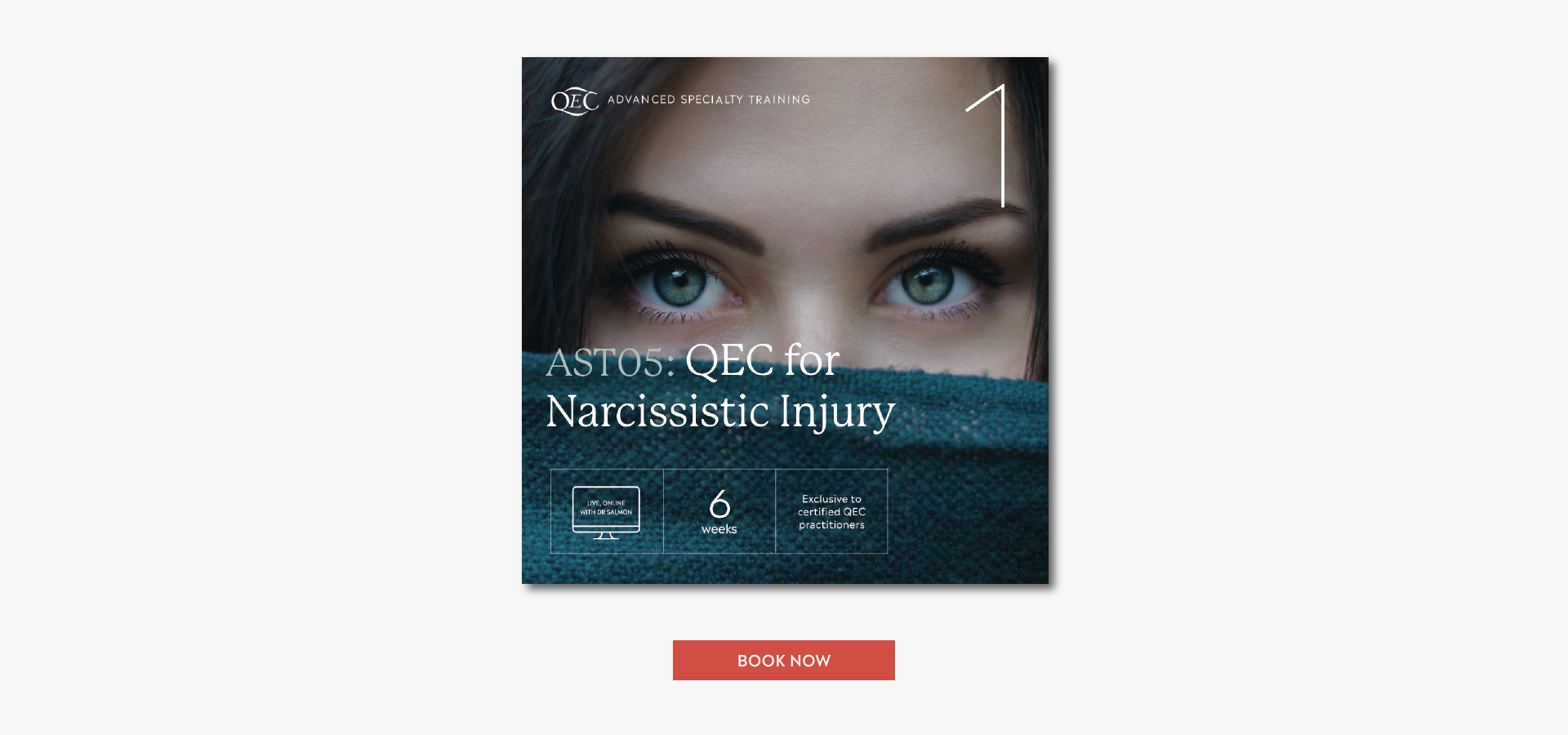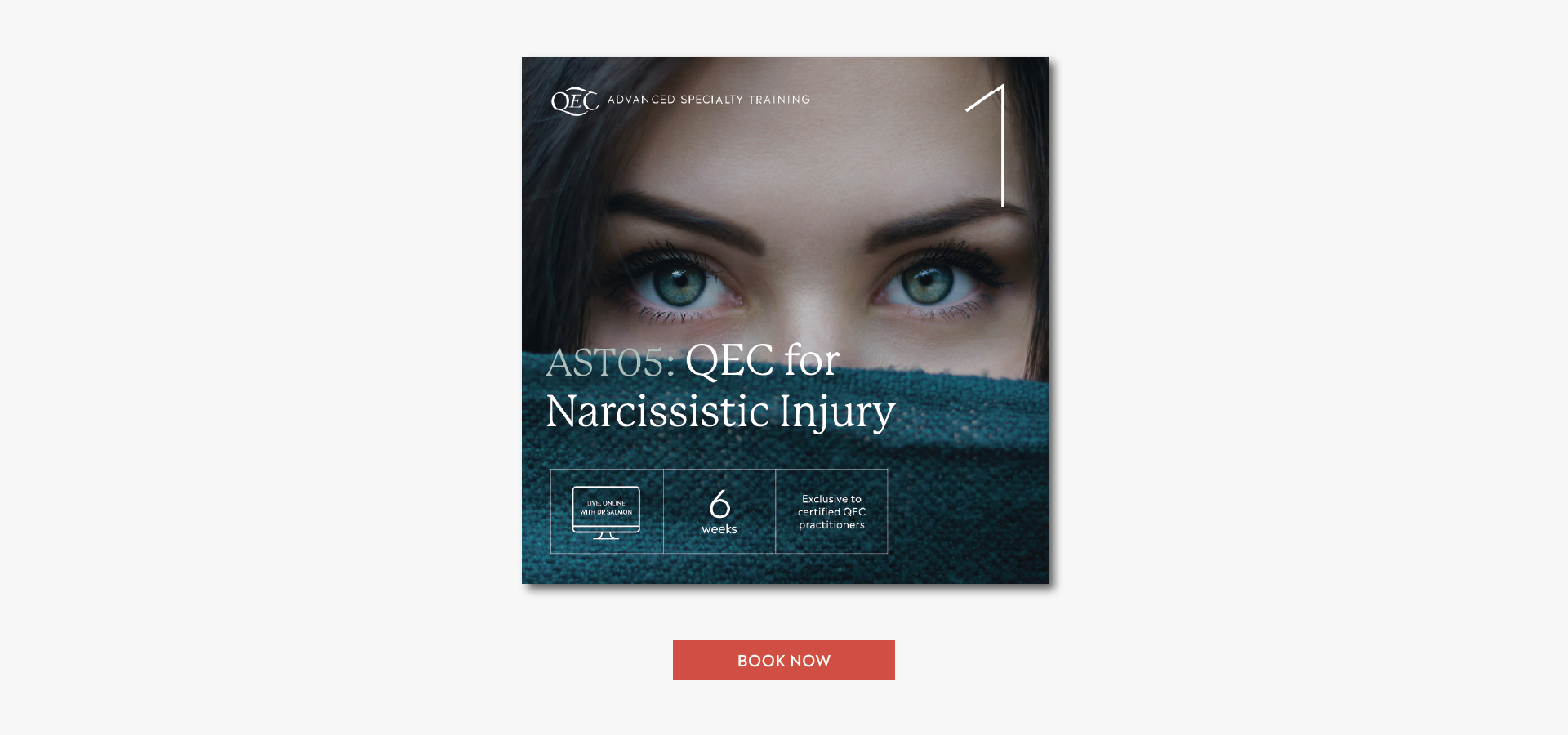Join Dr. Melanie Salmon as she shares her personal journey of healing from narcissistic injury—alongside decades of experience specialising in this powerful and sensitive area of work. Through her unique approach, combining Gestalt and QEC, Melanie offers deep insights and practical tools for real transformation.
What Advanced Training in QEC for Narcissistic Injury Offers
🌿 Expert Perspectives Gain the latest insights from global experts on the many variations of narcissistic injury—from the deeply personal to the collective and generational.
🌿 Relational Healing At the heart of recovery lies a safe, trusting relationship. In narcissistic injury, autonomy, self-love, and self-respect are often stripped away. Gestalt’s I–Thou relationship offers a powerful foundation for rebuilding trust through a new kind of healing connection.
🌿 QEC Framework for Empowerment This structured, proven approach helps clients move from the prison of self-sacrifice to the freedom of authenticity—supporting them to become fully alive, autonomous human beings.
🌿 The Trauma Formula A deep dive into trauma that begins in the womb and extends through adulthood—illustrated through Melanie’s own client case studies for real-world relevance.
🌿 Thematic Healing Work Learn creative strategies to unravel the “spider’s web” of recurring emotional themes—an essential part of long-term resolution.
🌿 Intergenerational Clearing Understand and release inherited narcissistic patterns from both sides of the family tree—clearing three generations and beyond.
🌿 Ongoing Client Support
Regular monthly connection can be key to maintaining integration once autonomy and deep healing have been reached.
"It is a basic human right to have your needs seen, respected, and responded to. Every individual deserves a separate identity—full of dreams, aspirations, and the joy of being truly connected to oneself. This training will equip you to support clients to take the journey, stepping out of the invalidating shadow and into the light of freedom and self-worth."
The QEC healing work with a client who has Narcissistic Injury is done in six phases.
The lectures will cover these phases as follows:
LECTURE ONE
Phase One: Building a Relationship of SAFETY and TRUST
Begin by bringing the autonomic nervous system (ANS) into a regulated state—out of freeze, overwhelm, addiction, or high emotional instability.
In this early phase, you’ll be working with the outer onion layers—these are the first beliefs to shift. Establish trust in both the method and in yourself as the practitioner. Use GESTALT enquiry each time: What’s uppermost? Work with whatever presents.
Remember: the relationship they experience with you is new, and likely hard to believe. Being seen, heard, and understood is the most crucial step in this work.
Do not rush into Trauma Formula (TF) work.
LECTURE TWO
Phase Two: Trauma Work – Ages 0–7
Trauma Formula in this stage is essential.
The template for life experience, especially in relationships, is set during this time. We will go into the depth of TF needed to undo the original programming:
“You are here only to serve my needs.”
LECTURE THREE
Phase Two Continued: Later Developmental Stages
Primary School – You'll often see repetition of the program through others: bullies, teachers, peers.
High School – More of the same, and likely a turn toward addiction for emotional relief.
Adulthood – Most adult traumas repeat the original template. These often show up in co-dependent relationships where the client's needs are consistently dismissed or overridden.
Current relationships are essential to work on in this phase.
LECTURE FOUR
Phase Three: THEME WORK
This forms the bulk of the ongoing work.
Here we address the spiderweb of hardwired life themes. These don’t shift easily with a single QEC installation.
Working in themes has greater impact—healing the network of beliefs tied to self and relationship.
Examples:
- People-pleasing
- Boundary issues
LECTURE FIVE
Phase Four: Intergenerational Healing
Narcissistic injury often spreads across generations.
It’s important to work back three generations on both sides of the family.
Phase Five: Addiction Work Final trauma formula work supports the release of addictions, seen here as traumas in themselves.
Note: Many behaviours can be understood as addictive—for example, co-dependency—and can be effectively transformed when approached this way.
LECTURE SIX
Phase Six: Integration and Looking Forward
Review the client’s goals and progress. Use QEC to support manifesting the way forward—in areas such as work, health, exercise, relationships, and creativity.
Monthly Follow-Up
I offer monthly review sessions to support ongoing growth, integration, and unexpected challenges—such as a new relationship, creative venture, or job.



